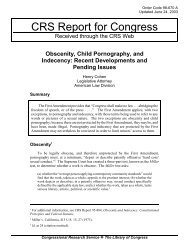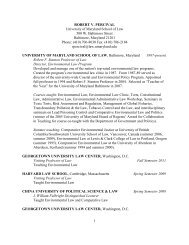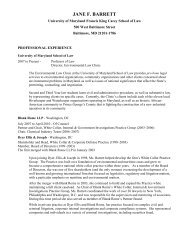Reducing Teen Pregnancy: Adolescent Family Life and Abstinence ...
Reducing Teen Pregnancy: Adolescent Family Life and Abstinence ...
Reducing Teen Pregnancy: Adolescent Family Life and Abstinence ...
Create successful ePaper yourself
Turn your PDF publications into a flip-book with our unique Google optimized e-Paper software.
CRS-6<br />
disease (an abstinence-plus policy); <strong>and</strong> 35% teach abstinence as the only option outside<br />
of marriage, with discussion of contraception prohibited entirely or permitted only to<br />
emphasize its shortcomings (abstinence-only policy). 10<br />
Advocates of the abstinence education approach argue that teenagers need to hear<br />
a single, unambiguous message that sex outside of marriage is wrong <strong>and</strong> harmful to their<br />
physical <strong>and</strong> emotional health. They contend that youth can <strong>and</strong> should be empowered<br />
to say no to sex. They argue that supporting both abstinence <strong>and</strong> birth control is<br />
hypocritical <strong>and</strong> undermines the strength of an abstinence-only message. They also<br />
mention recent research that indicates that teens who take virginity pledges to refrain from<br />
sex until marriage appear to delay having sex longer than those teens who do not make<br />
such a commitment. (The study found that teens who publicly promise to postpone sex<br />
until marriage refrain from intercourse for about a year <strong>and</strong> a half longer than teens who<br />
didn’t make such a pledge.) 11 They argue that abstinence clearly is the most effective<br />
means of preventing unwanted pregnancy <strong>and</strong> sexually transmitted diseases (including<br />
HIV/AIDS).<br />
Advocates of the more comprehensive approach to sex education argue that today’s<br />
youth need information <strong>and</strong> decision-making skills to make realistic, practical decisions<br />
about whether to engage in sexual activities. They contend that such an approach allows<br />
young people to make informed decisions regarding abstinence, gives them the<br />
information they need to set relationship limits <strong>and</strong> to resist peer pressure, <strong>and</strong> also<br />
provides them with information on the use of contraceptives <strong>and</strong> the prevention of<br />
sexually transmitted diseases. They note that abstinence-only messages provide no<br />
protection against the risks of pregnancy <strong>and</strong> disease for those who are sexually active.<br />
They point out that teens who break their virginity pledges were less likely to use<br />
contraception the first time than teens who had never made such a promise.<br />
Although there is much research <strong>and</strong> many evaluations on both abstinence-only<br />
programs <strong>and</strong> comprehensive sexuality education programs, there is no consensus on the<br />
effectiveness of these approaches. According to a 1997 report on research findings:<br />
At least four factors limit the conclusions that can be drawn from the many studies<br />
reviewed. First, the studies conducted to date are simply too few to evaluate each of<br />
the different approaches, let alone the various combinations of approaches. Second,<br />
many of these studies are limited by methodological problems or constraints. Third,<br />
these studies have often produced inconsistent results. And, fourth, there are very few<br />
replications of even the most promising programs that assess their impact in other<br />
types of communities <strong>and</strong> with other groups of youths. 12<br />
10 David J. L<strong>and</strong>ry, Lisa Kaeser <strong>and</strong> Cory L. Richards, “<strong>Abstinence</strong> Promotion <strong>and</strong> the Provision<br />
of Information about Contraception in Public School Districts Sexuality Education Policies,”<br />
<strong>Family</strong> Planning Perspectives (Alan Guttmacher Institute), 31(6), Nov.-Dec. 1999, pp. 280-286.<br />
11 Peter S. Bearman <strong>and</strong> Hannah Bruckner, “Promising the Future: Virginity Pledges As They<br />
Affect the Transition To First Intercourse,” American Journal of Sociology, Jan. 2001.<br />
12 Douglas Kirby, Emerging Answers: Research Findings on Programs to Reduce <strong>Teen</strong><br />
<strong>Pregnancy</strong>, May 2001, Commissioned by the National Campaign to Prevent <strong>Teen</strong> <strong>Pregnancy</strong>.















